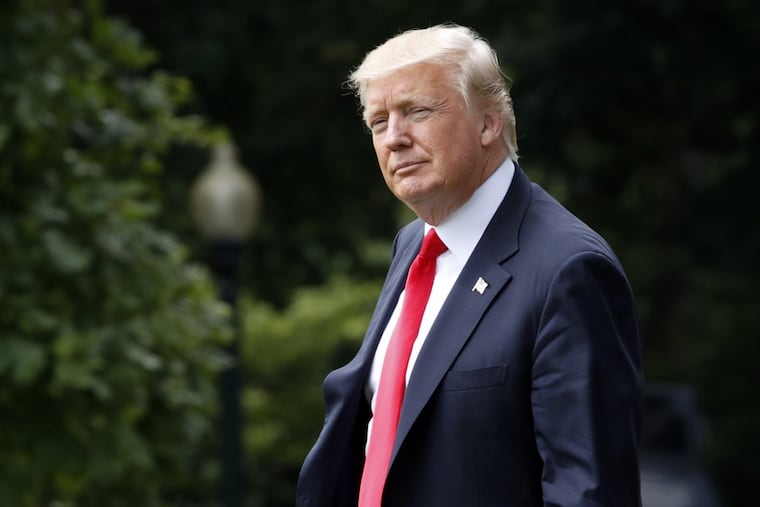From Iraq, a good-news immigration story
The tale concerns the reversal of a cruel injustice the U.S. bureaucracy perpetrated on the Albaiedhani family, whose sons worked as interpreters for the U.S. Army.

In this era of anti-immigrant rage, nothing has infuriated me more than its impact on Iraqis who helped the U.S. military at great risk to their lives.
So, as President Trump tweets up a storm demanding that the courts restore his "travel ban" on (mainly Muslim) immigrants, I'm happy to write a good-news immigration story. It concerns the reversal of a cruel injustice the U.S. bureaucracy perpetrated on the Albaiedhani family, whose sons worked as interpreters for the U.S. Army.
This reversal reflects the dedication of Peter Farley, the U.S. Army officer who went out on daily patrols with Wisam Albaiedhani. Like so many U.S. officers who have worked tirelessly to rescue their 'terps, Farley recognized what Americans owe to those Iraqis — and the shame of failing to pay that debt.
The Albaiedhani family paid a high price for its close association with U.S. forces. Radical Shiite militiamen shot Khalid Albaiedhani in the face and sent Wisam a bullet wrapped in cloth; they murdered an uncle who had also worked as an interpreter. The brothers escaped to the United States, helped by Farley, and found jobs, but had been trying for years to rescue their parents and younger siblings in Baghdad.
After five years of extreme security vetting, the family was told it had cleared all hurdles for visas; the parents sold their home and all their possessions and were prepared to fly from Baghdad for Massachusetts last August, only to have the U.S. government suddenly withhold and then deny their visas — no reason given, no chance of appeal. Wisam got the final notice last year on the day before Thanksgiving.
Such denials are almost never reversed. Until this week, the family was living in limbo in Baghdad, crowded in with relatives, under intense fear of militia reprisals with little hope. Then, suddenly, came word, via the brothers' pro bono lawyer working with the International Refugee Assistance Project, that the denial had indeed been rescinded, pending one last security check.
"We still can't believe it. My dad had heart issues in the last three weeks and was hospitalized in Baghdad, but he was jumping like a little kid," Wisam told me by phone from Haverhill, Mass. "We are trying to balance excitement with caution," Farley told me, given the memory of how things can suddenly take a bad turn.
So how did this near miracle happen? Much of the credit goes to Farley, a former elementary school teacher now working for Veterans Affairs in Rhode Island, who volunteered to fight in Iraq because he felt it was his patriotic duty. He wound up training Iraqi military police, with Wisam constantly beside him.
Farley mobilized a petition in support of the family on Change.org that garnered 22,000 signatures from all over the country. He asked signatories to contact their local representatives and ask them to send letters of support for the Albaiedhanis.
He also reached out to Massachusetts senators and congressmen, in his and in Wisam's home districts, and beyond to send letters of support, tracking down Democratic Congressman Seth Moulton, a four-tour Iraq veteran on Facebook. Moulton replied personally and invited Wisam to speak at a Veterans' Day commemoration in his district, where many of the vets thanked Wisam for his service.
"Not a lot of Americans know what these vets went through," Wisam told me last year. "Not a lot of Americans know what we interpreters went through."
Farley knows. "Wisam was a veteran," he told me, with emotion. "Wisam and his family sacrificed more because they had to stay in Iraq and I could come home to the USA."
Most powerful among their support letters, says Farley, was one from a Gold Star mother, Ida Gonzalez, whose fallen son, Specialist Michael L. Gonzalez, also trained Iraqi police. She has become a friend of Wisam's, Farley says, "despite the fact that her son was killed by masked men in the name of Islam. She was able to differentiate between [that and] good Muslims who want the best for their country."
All this material was forwarded in support of the Albaiedhanis' case. "When agencies know there are eyes on it they do pay attention to individual cases," says Farley. But this Iraq vet is fearful that every day Wisam's family still has to wait for their visas increases the chance that they may suffer militia reprisals.
And Wisam tells me he's concerned that Trump is again pushing for a broad travel ban against Muslims, or at minimum a temporary halt to refugee resettlement. "I'm afraid he could push this through the Supreme Court and this would put my family in jeopardy," he said. "My family has been living in limbo since August, and we hope it won't take more years for them to get here."
From his lips to the Supreme Court justices' ears.